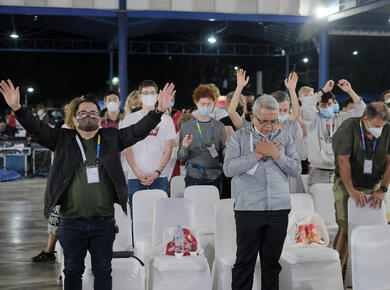Posted: March 7, 2023
After this I looked, and there was a great multitude that no one could count, from every nation, from all tribes and peoples and languages, standing before the throne and before the Lamb, robed in white, with palm branches in their hands. (Revelation 7:9, NRSV)
The first time I saw a horror movie was one evening at a church. I was around eight years old when my mother took me to the premiere of a Christian film about the book of Revelation. That night I could hardly sleep. I dreamed that Christ had come for his church and that I had stayed behind to suffer what would be the Great Tribulation.
There are different ways of looking at the book of Revelation. Some of them, quite terrifying, fill people with fear. Others, in the voice of some preachers, use this book as a crystal ball to discover the future and explain the events regarding the end of humanity. Countless films and books have fed on such ways of understanding this type of literature.
Another option is to consider the book of Revelation as God’s vision for creation. As such, it shows God’s will for humanity and invites us to live in our present according to that will. Through the book of Revelation, we are asked, we are called to be a sign of God’s kingdom here and now.
Speaking about God’s vision, about God’s invitation, the Mennonite World Conference (MWC) vision statement says:
Mennonite World Conference is called to be a communion (Koinonia) of Anabaptist-related churches linked to one another in a worldwide community of faith for fellowship, worship, service, and witness.
According to our MWC vision, worship is one of the purposes of being one, of enjoying a global community of faith, of being a worldwide communion. In that sense, it follows the emphasis the book of Revelation gives to worship in a multicultural setting. The sentence “from every nation, from all tribes and peoples and languages” appears several times in Revelation in the context of worship. At MWC, we want to be a foretaste of God’s future by being – here and now – a global communion that worships God amid cultural and linguistic diversity.
The kind of worship exercised in such a diverse community must be centred on Jesus. That makes it possible to value multicultural diversity without privileging specific cultures but giving the same value to all cultures and languages. That kind of worship does not suppress or ignore differences. It celebrates multicultural diversity. That has been and continues to be our experience, call and challenge in MWC.
With worship being such a prominent theme in MWC circles, this first electronic-only issue of Courier addresses it from different perspectives. In particular, it touches on the challenges and points of view of various members of our global communion when COVID-19 pushed their congregations to re-imagine communal worship, an experience we also faced globally by the impossibility of celebrating worldwide encounters in person.
Does online worship replace on-site liturgies? That and other questions that emerged because of the pandemic may help us to keep our conversation going to respond to God’s call to worship multiculturally and, by doing so, bear witness to the world of a God that celebrates and makes possible cultural diversity.
— César García, MWC general secretary, originally from Colombia, lives in Kitchener, Ontario, Canada.



Join the Conversation on Social Media
FacebookTwitterInstagramFlickrYouTube